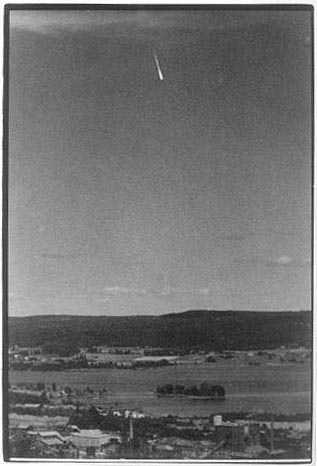While I was reflecting on the current epidemic of sightings of "mystery missiles", not only in California but elsewhere, it occurred to me that people were actually reporting "ghost rockets" today. After all, a "mystery missile" is no different from a "ghost rocket." Indeed, it seems likely that some future book about UFOs will contain a sentence along the lines of, "Sightings of 'ghost rockets' began occurring in the U.S. and Canada around 2010." Thus far, all of these North American Ghost Rockets appear to be attributable to high-altitude contrails from jet aircraft.
Were there any high-altitude aircraft capable of creating contrails flying around Scandinavia in 1946? Large planes flying at high altitudes, such as the B-17 or B-29, will typically produce contrails when meteorological conditions are favorable. There is no need for them to be jets. A dispatch from the U.S. Naval Attache in Stockholm, dated Aug. 16, 1946 and formerly classified "Top Secret," talks of "civilian observers reporting jet fighters, contrails and meteors as rockets" ( http://www.project1947.com/gr/grchron2.htm ) The U.S. used the high-altitude B-29 bomber for reconnaissance in the arctic following World War II, as well as in Europe.
Some of the "ghost rockets" were surely meteors, especially those seen at night, described as fast-moving and only seen for a few seconds. Still others were probably astronomical objects, described as bright lights hovering in the night sky. People tend to scrutinize the heavens more than usual when they have heard that unusual objects are zipping about. But other "ghost rockets" were described as moving much more slowly, and flying horizontally. These sound much more like contrails. The single "classic" photo of a Swedish "Ghost Rocket," seen in the Wikipedia article, is usually attributed to a meteor, but looks very much like a high-altitude contrail. Notice the cirrus clouds above it. "Contrails are a form of cirrus cloud," ContrailsScience.com reminds us. Indeed, the meteorological conditions that produce contrails are the same as those producing cirrus clouds. If cirrus clouds cannot be produced, then neither can contrails.
 | ||
| The "classic" 1946 photo of a "ghost rocket" in Sweden. Isn't this a contrail? |
ContrailScience.com has several very interesting incidents of contrail hysteria in the U.S., going back as far as 1950. ( http://contrailscience.com/contrail-confusion-is-nothing-new/ ). That's getting awfully close to 1946.
It has often been suggested that the Swedish "ghost rockets" of 1946, reports of which were carried worldwide, played a role in creating the "flying saucer" excitement that broke out over Kenneth Arnold's sighting the following year. And thus, in creating the entire UFO scenario. So, what I'm suggesting is that the "ghost rockets" excitement of the present year seems to be a replay of the earlier Swedish excitement. We know from present experience that jet contrails can fool even some very sophisticated people into believing that they are seeing rockets or missiles, and this in a time when contrails are already a very familiar sight.
Thus it seems very likely that the main stimulus behind the "ghost rockets" of 1946 was the presence of contrails in the sky, in a time when that phenomenon was new and not at all familiar. World War II had ended just the previous year, and it was known that the U.S. and the USSR were both frantically pursuing missile development, using captured German rocket scientists. Everybody knew that the Cold War could turn into a "hot war" at any moment, and on several occasions it nearly did. Sweden and the rest of Scandinavia were literally in the middle of it, between the allies US/UK/France, and their adversary, the Soviet Union. It is no wonder that, in such an atmosphere, people in Sweden, seeing the unfamiliar new phenomenon of high-altitude contrails, sometimes perceived them as menacing rockets launched by one great power or another.
Those in the U.S. and Canada today, however, who make up conspiracy stories in the same vein, even in situations where "ghost rockets" would have to have been fired on land, do not have the extenuating circumstances that the Swedes had sixty-four years earlier.
0 comments:
Post a Comment